Understanding payment in China is crucial for a smooth and stress-free trip. While China was once heavily cash-based, today it leads the world in mobile payments, and the traditional credit card or cash-in-wallet approach no longer applies in most situations. If you’re planning to travel in China in 2025, here’s what you absolutely need to know about how to pay for food, transportation, shopping, and everything in between.
This is your complete guide to navigating payments in modern China – what works, what doesn’t, and how to prepare before you arrive.

Mobile Payments Dominate
China’s financial ecosystem is largely cashless, with mobile payment apps like Alipay and WeChat Pay accounting for the vast majority of transactions – from luxury stores in Shanghai to food stalls in rural towns.
1. Alipay (支付宝)
- Alipay is China’s most widely used mobile payment platform.
- As of 2023, foreign tourists can use Alipay without a Chinese bank account or phone number.
- You can link your international Visa, MasterCard, Discover, or JCB card directly to the app via the “Tour Pass” mini program inside Alipay.
- This makes it easy to pay for taxis, shopping, entrance tickets, food, and even street vendors.
Pro Tip: Download the app before arrival and verify your passport and card ahead of time to save time once in China.
2. WeChat Pay (微信支付)
- The second giant in the market is WeChat Pay, integrated within the WeChat app.
- WeChat also now allows international credit cards to be added (select Visa, Mastercard, JCB).
- You can use WeChat Pay at most restaurants, metro stations, hotels, and convenience stores.
- It also lets you split bills, send money, and even buy train tickets and SIM cards.

Credit and Debit Cards: Limited Acceptance
While mobile payments are king, credit and debit cards still work in certain places – mostly high-end hotels, international chains, and some airports.
- Visa, MasterCard, and American Express may be accepted, but it is not guaranteed even in cities like Beijing or Shanghai.
- In rural areas or smaller cities, cards are rarely accepted.
- UnionPay is the most widely accepted card network, but most foreign-issued cards do not use this system.
Recommendation: Do not rely solely on plastic cards. Always have a mobile payment method set up or cash as backup.
Cash: Still Useful (Sometimes)
While you can technically still use cash (RMB/¥), its usefulness is limited:
- Many taxis, street vendors, and public toilets are mobile-payment-only.
- Some rural areas and small vendors may still accept cash – especially in older markets or villages.
- Make sure you have small denominations, as some places won’t have change for large bills.
Currency Exchange: Exchange a small amount of RMB at the airport, a bank, or withdraw from an ATM that supports foreign cards (Bank of China and ICBC are more reliable).
How to Prepare Before Your Trip
Here’s a checklist to make sure you’re financially ready for your China trip:
- ✅ Download Alipay and/or WeChat on your phone.
- ✅ Create an account using your passport.
- ✅ Link an international credit card to the app.
- ✅ Practice navigating the app and learn to scan QR codes.
- ✅ Inform your bank of international travel to avoid card blocks.
- ✅ Consider carrying a backup card in case of loss or malfunction.
Paying for Transportation, Attractions & Daily Needs
Public Transport
- Subways and buses in major cities (like Shanghai, Beijing, Chengdu) accept Alipay and WeChat Pay via QR code.
- Tourists can also buy rechargeable metro cards, but locals overwhelmingly use phone apps.
- Didi (China’s Uber) accepts mobile payment only, and Alipay/WeChat is required to hail a ride.
Restaurants & Cafes
- From Michelin-starred restaurants to hole-in-the-wall noodle shops, QR-code payment is the standard.
- Most eateries have stickers on the table or wall to scan and pay directly.
- Don’t expect to tip – tipping culture is uncommon and not required.
Shopping
- Retail stores use QR codes and mobile pay terminals.
- Bargaining markets may accept cash, but vendors prefer mobile pay.
- Always ask: “可以用支付宝/微信吗?” (Can I use Alipay/WeChat?)
Common Mistakes to Avoid
- ❌ Arriving without a working mobile payment method
- ❌ Assuming your international card will be widely accepted
- ❌ Bringing only large cash notes
- ❌ Forgetting to enable international usage on your bank app
Avoiding these pitfalls can make your payment experience in China smooth and stress-free.
Extra Travel Tip: Use a Local SIM or eSIM
Both Alipay and WeChat require an internet connection to function. Make sure you have a local SIM or eSIM with data to access your payment apps at all times. Public Wi-Fi in China is not always reliable.
Let Next Level China Help You Travel Worry-Free
Planning your own trip to China is exciting – but navigating payments, bookings, and the language barrier can still be overwhelming. At Next Level China, we make travel seamless:
- 🧭 Personalized itineraries tailored to your interests
- 🗣 English-speaking guides to assist with local logistics
- 📲 Pre-trip setup help (including payment apps and SIMs)
- 🚗 All-included packages with transportation and activities
Ready to Explore China Without Worrying About Payments?
Let us take care of the details. Contact Next Level China today for a no-obligation travel proposal, and enjoy a cashless, carefree journey through China’s ancient wonders and modern marvels.




